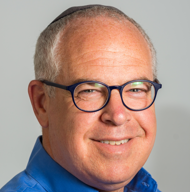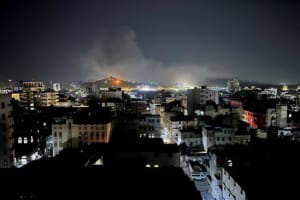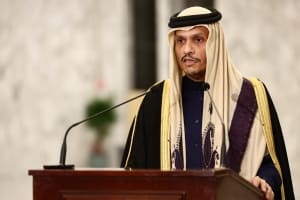Jordan’s king claims to protect Christians in the Middle East... But does he?

I was disappointed to read of Jordanian King Abdullah II warning Israel not to cross “red lines” on Jerusalem during a Christmastime interview on CNN.
Curious as to the nature of King Abdullah’s warning, I decided to watch the interview rather than just comment based on the politicized reports, where the headlines serve as clickbait.
By way of full disclosure, I have nothing against King Abdullah. I think he’s quite a rational, stable and important leader, for Jordan and for Israel. A close alliance between our countries is important.
Interestingly, Abdullah II’s great-grandfather, Abdullah I, moved to the region 100 years ago after being appointed Emir of Trans-Jordan. He and his brother were rewarded for their loyalty to Britain with the territory of what’s today’s Jordan and Iraq. As Hashemites, they were moved from their native Mecca, where the Saudi dynasty had taken control of the Arabian peninsula, to these new made-up entities. It was not considered an upgrade at the time, but they took what they could get.
This was around the same time my grandparents came home to Israel, ending their and their descendants’ (my family’s) diaspora.
Regarding family, I have a lovely photo of the king’s father, King Hussein, and my father in the early 1990s, just before Israel and Jordan formalized a peace agreement. My father was overjoyed to meet the king, but also because peace was coming to our countries.
I can see the skyline of Amman from my home, underscoring the geographical proximity and all the historical and modern security issues that go along with it, and I’d very much like to meet King Abdullah as my father met his father. However, I must take exception with what he said.
Indeed, King Abdullah did issue warnings. He cautioned against Jerusalem being “used by extremists on all sides,” an important comment placing himself in the middle. But his criticism of Israel was unique.
“If we continue to use Jerusalem as a soapbox for politics,” he said, “things can get out of control.” Jerusalem is a “tinderbox that, if it flashes, we won’t be able to walk away from [in the near future].”
King Abdullah underscored how he wants to be perceived as a centrist, engendering sympathy by “living between Iraq and a hard place.” Yet, he warned from his own soapbox that “if people want to get into a conflict with us, we are quite prepared. I like to … look at the glass half full, but we have red lines.”
While he was not threatening a third intifada, he did toss that in as a possible consequence of crossing these red lines. The “people” he was referring to were Israelis, and the red lines are related to Israel’s presence in and control of parts of Jerusalem, specifically those over which he sees himself as the “custodian.”
The Jordan River that separates our countries is often brown and murky. So, too, King Abdullah’s words were murky. He repeated a baseless claim he’s made before, that, as the Muslim Hashemite leader, he’s custodian of Christian and Muslim holy sites. In fact, he’s not. Jordan’s custodianship only applies to Islamic sites.
King Abdullah spoke of the shrinking number of Christians in the region, noting that the number is dropping under “pressure.” He didn’t say it outright, but the pressure to which he was referring is supposedly from Israel. But that too is false.
While indeed, the situation of Christians in the region is dire, around the same time as King Abdullah’s CNN interview, Israel released demographics showing a 2% increase in the Christian population in Israel. That’s the only place in the region where the number of Christians is actually growing, at least that we know of, because people converting to Christianity in the Arab/Muslim world are threatened and, therefore, numbers are speculated about but not widely reported on. In fact, the actual pressure on Christians comes from the wider Islamic society in which they live.
But if the king is concerned about the well-being of Christians in the region, he should start in Jordan itself. Why, when I met a Christian woman visiting Jerusalem recently, would she not be photographed with me, or even in Jerusalem, for fear of herself and her ministry in Jordan being threatened? The same happened with a Christian Palestinian Arab from Bethlehem with whom I had the opportunity to do business recently. When I suggested taking a picture, he stiffened, and he told me that could be dangerous for him in the Palestinian Authority.
One of the most “remarkable” comments King Abdullah made – that Islam reveres Jesus as messiah – is not just a false statement, but such a stretch. Not only is that not the truth, but it’s such a stretch, it’d be surprising if the king didn’t have to walk it back for fear of being branded a heretic. That comment could be very dangerous for him and his kingdom, where he constantly has to underscore his legitimacy as a Hashemite leader of a country that predominantly comprises Palestinian Arabs.
Fortunately, a public secret in the relationship between Israel and Jordan is Israel’s intelligence and security cooperation that helps keep the Hashemites on the throne.
Sitting on the east bank of the Jordan River, the king said this [where Jesus was baptized] was the third holiest site in Christianity. I asked many Christian friends if this was true and, if so, what the first and second most holy Christian sites were. Without exception, all said that a ranking of such sites is disingenuous, and if it were legitimate, there are other sites that would be in contention for third place, fourth, fifth and even sixth, ahead of the king’s claimed “third place.”
Then again, with Islam’s third holiest site being in Jerusalem but never once mentioned in the Quran, perhaps his use of the term is deliberately vague.
Others suggested that he was just pandering to gain sympathy and be perceived as the savior (pun intended) of Christians in the Middle East, placing a wedge between Jews and Christians, and our shared biblical understanding of the significance of the Land and people of Israel.
His saccharine words, “we are committed to defending the rights, the precious heritage and historic identity of Christians of our region,” were so sweet I wanted to gag.
The king’s warning about protecting the “status quo” in Jerusalem undermines the rights of Jews and Christians who, by law, are denied the right to pray on the Temple Mount where Jordan actually has custodianship. Denying our right to pray at what’s arguably the holiest place in Jerusalem must be one of his red lines, which he sees no problem enforcing, while “defending the rights … of Christians.”
Despite his claims to protect Christians and Christian sites, I was left with the feeling that with friends like these, we don’t need another Judas.

Jonathan Feldstein was born and educated in the U.S. and immigrated to Israel in 2004. He is married and the father of six. Throughout his life and career, he has become a respected bridge between Jews and Christians and serves as president of the Genesis 123 Foundation. He writes regularly on major Christian websites about Israel and shares experiences of living as an Orthodox Jew in Israel. He is host of the popular Inspiration from Zion podcast. He can be reached at [email protected].














